Faculty of Health Care Department of Nursing Science To become a care professional
English translation in progress. Thank you for waiting.
Contents
Department Overview
This Department is suitable for the following people:
- Those who aspire to become registered nurses
- Those who wish to train at advanced medical institutions
- Those aiming to become midwives or public health nurses
Learning Key Points
01. Fostering knowledge, practical skills, and a spirit of compassion
Guided by the Faculty’s core philosophy—“Exerting oneself for the sake of others”—our curriculum cultivates the essential components of nursing: science (a solid foundation in nursing knowledge), art (practical nursing skills), and humanity (a compassionate heart for care). Through lectures, seminars, and practicum, students become prepared to put these elements into action. Graduates also have the opportunity to pursue further studies and obtain national qualifications as midwives or public health nurses.
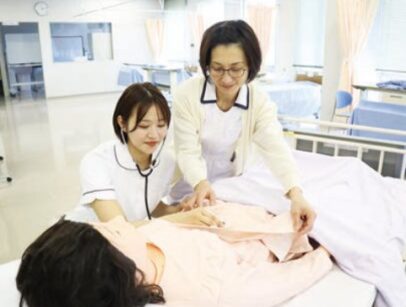
02. Clinical Training at Tenri Hospital
Clinical training provides students with the opportunity to integrate the knowledge and skills they have
acquired through lectures and seminars, further enhancing their nursing competencies.
Training takes place at Tenri Hospital, a leading advanced medical institution located just steps from the campus—a unique advantage of our Faculty. Students are supported by a well-coordinated system in which faculty members and clinical instructors work closely together. During training, students also have the chance to meet and learn from many alumni who are active in the field.
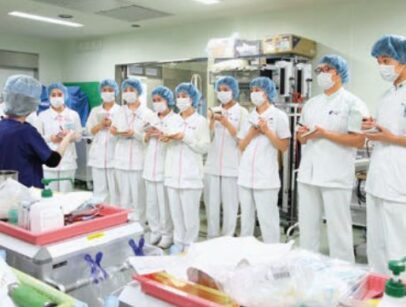
03. Over 90% of graduates are employed at Tenri Hospital
More than 90% of graduates secure positions at Tenri Hospital. Some students choose to pursue further education to obtain qualifications as midwives or public health nurses. Our graduates also find employment in a wide range of settings, including hospitals, home-visit nursing services, public health centers, social welfare facilities, companies, and in-house medical offices.
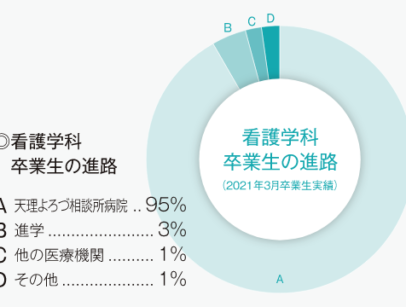
Career support to make the most of your learning for the future
Comprehensive support for the National Nursing Examination
To ensure that all students pass the National Nursing Examination, we provide thorough support from the first through the fourth year, led by the homeroom instructors. In the first and second years, students take mock exams tailored for early-year levels. In the third year, mock exams are
supplemented with preparatory lectures. By the fourth year, students receive intensive support
including mock exams, subject-specific review sessions, and one-on-one tutoring focused on individual weaknesses. Faculty members provide personalized guidance based on each student’s level of achievement. We also offer exam preparation and interview coaching for those pursuing advanced qualifications such as midwifery or public health nursing, as well as for students aiming to enter graduate school.

Four-year learning process
First-year
続きを読むCultivating humanity and building a foundation in nursing
While developing a well-rounded character through general education courses, students also learn
about the structure of the human body, the mechanisms of disease, and medical treatments. At the
same time, psychology subjects and seminars help them enhance their interpersonal skills.Representative Classes
 ・Life in Community and Nursing
・Life in Community and Nursing
Through fieldwork, students explore how local living environments and lifestyles impact health. They investigate how nursing can support individuals in maintaining their unique ways of living within the community.
Second-year
続きを読むAcquiring specialized knowledge and skills
Students begin to take subjects in specialized areas of nursing and healthcare. They develop the expertise and practical skills necessary to provide appropriate, individualized nursing care tailored to each patient’s unique needs.
Representative Classes
 ・Health Assessment
・Health Assessment
This seminar provides practical training in health assessment and equips students with essential skills to apply the nursing process in delivering appropriate, patient-centered care.
Third-year
続きを読むDeveloping practical nursing skills through clinical training
During the first half of the course, students acquire a variety of nursing methodologies. In the second half, through clinical placements in hospital wards and care facilities, students work to develop practical nursing skills tailored to the diverse needs of patients.
Representative Classes
 ・Chronic Care and Transitional Care Nursing Practicum
・Chronic Care and Transitional Care Nursing Practicum
Students will acquire the basic skills for providing nursing care that addresses the health issues of patients and their families requiring long-term care. They learn to support improved quality of life during extended treatment and to facilitate a smooth transition to home-based care.
Fourth-year
続きを読むEnhancing competence in holistic care
In the “Nursing Research” subject, students develop research proposals with the guidance of their instructors. While deepening their competence in providing holistic nursing care, they also prepare for the National Nursing Examination.
Employment Results and Qualifications
98.7%
※Actual results of March 2025
Including data based on graduates of the former Tenri Health Care University
Major employers (information for the most recent 5 years)
Tenri Hospital, Nara Medical University Hospital, Nara Prefectural Hospital Organization, Osaka Prefectural Hospital Organization, Saiseikai Ibaraki Hospital, Kyoto Katsura Hospital, Kenshukai Suzuran Hospital, Seirei Hamamatsu General Hospital, Nagoya Ekisaikai Hospital, Saiseikai Takaoka Hospital etc. (listed in no particular order)
Main higher education destinations
Midwifery Program, Kio University, Advanced Course in Midwifery, Yamato University Hakuho Junior College Division, Midwifery Department, Tottori Prefectural Kurayoshi College of Nursing, St. Barnabas Midwifery College (listed in no particular order)
Available Qualification
- Eligibility to take the National Nursing Examination
National Exam Pass Rate for Nurses
97.2%
Average Pass Rate from the past three years:
March 2025 Graduates: 97.4%
March 2024 Graduates: 97.3%
March 2023 Graduates: 97.1%
The average pass rate for the Nursing Department over the past three years (including the time when it was Tenri Health Care University) has been at a high level compared to the national average of 90.1% (114th National Nursing Examination).
Faculty list
Curriculum
Curriculum tree(PDF)
Curriculum map(PDF)
Education Policy
Admission Policy
In order to fulfill the educational goals of the Department of Nursing Science, we seek for people with the following qualities:
1. (Thought) Those who possess a rich sense of humanity and a strong sense of ethics and are eager to develop a scientific and professional mindset to help people achieve healthier lives.
2. (Knowledge, Attitude) Those who aim to provide high-quality nursing care by actively seeking out and applying up-to-date knowledge and skills in nursing and related fields.
3. (Attitude, Action) Those who wish to cultivate excellent communication skills and the ability to build mutual understanding and positive relationships with others through dialogue.
4. (Knowledge, Skills) Those who wish to acquire the ability to collaborate with professionals in health care, medical services, and welfare as a member of the nursing profession.
5. (Thought, Knowledge, Attitude) Those who consistently approach practice with a research-oriented perspective, and who wish to develop logical thinking and analytical attitudes to identify and solve issues in nursing practice.
6. (Creativity, Action) Those who wish to acquire the qualities necessary to contribute to the health of people with diverse values from a global perspective.Entrance examination methods will take various forms, such as comprehensive selection, school
recommended selection, general selection, and common test selection.Curriculum Policy
We offer “Comprehensive Education Subjects,” which lay the foundation necessary for becoming a healthcare professional, and “Specialized Education Subjects,” which build upon that foundation to provide the basis for each specialized subject.
Among the Specialized Education Subjects, the curriculum includes:
Specialized Common Subjects, which cover topics such as physical, psychological and social, as well as public health, medical care, and welfare.
Specialized Nursing Subjects, which focus on nursing throughout the stages of a person’s growth and development.
These subjects are systematically arranged to ensure progressive learning throughout the four-year program. In the first year, students take lectures, seminars, and practicum designed to help them acquire foundational competencies essential for nursing practice. In the second and third years, students deepen their knowledge and skills through lectures, seminars, and practicum based on what they have learned in earlier courses, progressing step by step to acquire the competencies required for professional nursing. In the fourth year, the curriculum includes integrative and advanced nursing subjects, including community health education, as well as a wide range of elective courses aimed at preparing students for future roles as generalists or specialists.Diploma Policy
A bachelor’s degree (Nursing Science) will be awarded to students who have acquired the following knowledge and abilities:
1. (Thought) Those who have acquired a rich sense of humanity and a high level of ethical awareness and have developed a scientifically grounded and professional orientation to help people achieve healthy lives.
2. (Knowledge, Attitude) Those who are capable of actively seeking and applying the latest knowledge and skills in nursing and related academic fields in pursuit of high-quality nursing practice.
3. (Attitude, Action) Those who have acquired excellent communication skills and are able to build mutual understanding and good interpersonal relationships with individuals through dialogue.
4. (Knowledge, Skills) Those who have developed the ability to work collaboratively with a wide range of professionals in healthcare, medical, and welfare fields as nursing professionals.
5. (Thought, Knowledge, Attitude) Those who can maintain a research-oriented perspective and are capable of logical thinking and analysis to identify and solve issues in nursing practice.
6. (Creativity, Action) Those who have acquired the qualities necessary to contribute to the health of people with diverse values from a global perspective.

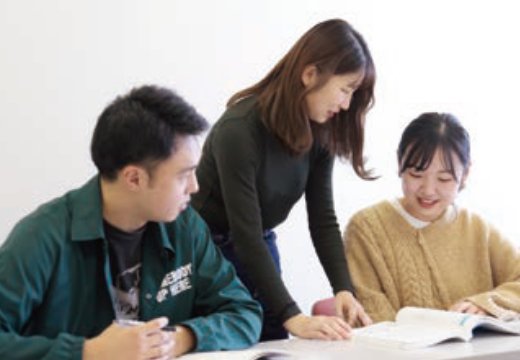 ・Life in Community and Nursing
・Life in Community and Nursing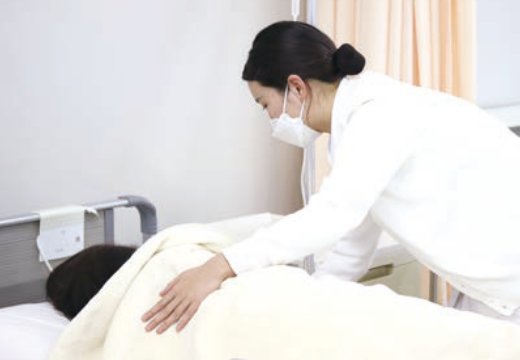 ・Health Assessment
・Health Assessment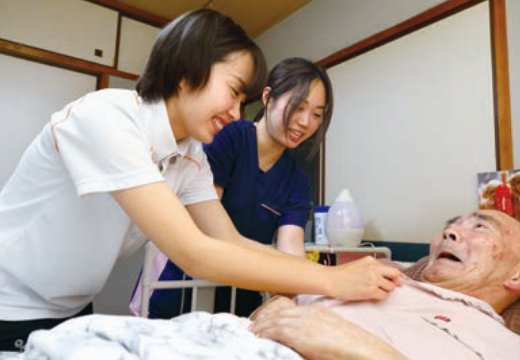 ・Chronic Care and Transitional Care Nursing Practicum
・Chronic Care and Transitional Care Nursing Practicum